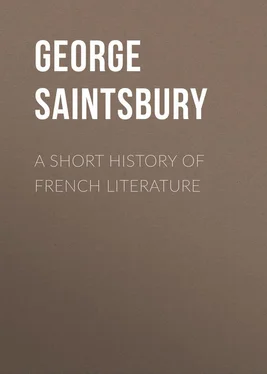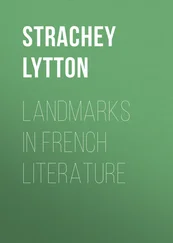George Saintsbury - A Short History of French Literature
Здесь есть возможность читать онлайн «George Saintsbury - A Short History of French Literature» — ознакомительный отрывок электронной книги совершенно бесплатно, а после прочтения отрывка купить полную версию. В некоторых случаях можно слушать аудио, скачать через торрент в формате fb2 и присутствует краткое содержание. ISBN: , Жанр: foreign_prose, на английском языке. Описание произведения, (предисловие) а так же отзывы посетителей доступны на портале библиотеки ЛибКат.
- Название:A Short History of French Literature
- Автор:
- Жанр:
- Год:неизвестен
- ISBN:http://www.gutenberg.org/ebooks/33062
- Рейтинг книги:3 / 5. Голосов: 1
-
Избранное:Добавить в избранное
- Отзывы:
-
Ваша оценка:
- 60
- 1
- 2
- 3
- 4
- 5
A Short History of French Literature: краткое содержание, описание и аннотация
Предлагаем к чтению аннотацию, описание, краткое содержание или предисловие (зависит от того, что написал сам автор книги «A Short History of French Literature»). Если вы не нашли необходимую информацию о книге — напишите в комментариях, мы постараемся отыскать её.
A Short History of French Literature — читать онлайн ознакомительный отрывок
Ниже представлен текст книги, разбитый по страницам. Система сохранения места последней прочитанной страницы, позволяет с удобством читать онлайн бесплатно книгу «A Short History of French Literature», без необходимости каждый раз заново искать на чём Вы остановились. Поставьте закладку, и сможете в любой момент перейти на страницу, на которой закончили чтение.
Интервал:
Закладка:
Fiction
The prose fiction of the period has been kept to the last, because it expresses a different order of literary endeavour from those divisions which have hitherto been treated. The language of the middle ages was ill-suited for work other than narrative; for narrative work it was supremely well adapted. Yet the prose fiction which we have is not on the whole equal in merit to the poetry, though in one or two instances it is of great value. The medium of communication was not generally known or used until the period of decadence had been reached, and the peculiar defects of mediaeval literature, prolixity and verbiage, show themselves more conspicuously and more annoyingly in prose than in verse. We have, however, some remarkable work of the later periods, and in the latest of all we have one writer, Antoine de la Salle, who deserves to rank with the great chroniclers as a fashioner of French prose.
The French prose fiction of the middle ages resolves itself into several classes: the early Arthurian Romances already noticed; the scattered tales of the thirteenth and fourteenth centuries, which are chiefly to be studied in two excellent volumes of the Bibliothèque Elzévirienne 144 144 Nouvelles du 13e et du 14e siècle. Ed. Moland et Héricault. 2 vols. Paris, 1856.
; the versions of such collections of legends, chiefly oriental in origin, as the History of the Seven Wise Men and the Gesta Romanorum ; the longer classical romances in prose; the late prose remaniements of the great verse epics and romances of the twelfth century; and the more or less original work of the fifteenth century, when prose was becoming an independent and coequal literary exponent. The first class requires no further mention; of the third, the editions of the Roman des Sept Sages , by M. Gaston Paris 145 145 Paris, 1876.
, and of the Violier des Histoires Romaines , by M. Gustave Brunet 146 146 Paris, 1858.
, may be referred to as sufficient instances; of the fourth a very interesting specimen has been made accessible by the publication of the prose Roman de Jules César of Jean de Tuim 147 147 Ed. Settegast. Halle, 1881.
, a free version from Lucan made apparently in the course of the thirteenth century, and afterwards imitated by the author of the verse romance; the fifth, though very numerous, are not of much value, though the great romance of Perceforest and a few others may be excepted from this general condemnation. The second and the last deserve a longer mention.
The tales of the thirteenth and fourteenth centuries, as published by MM. Moland and Héricault, are eight in number. Those of the second volume are on the whole inferior in interest to those of the first. They consist of Asseneth , a graceful legend of the marriage of Joseph with the daughter of the Egyptian high-priest; Troilus , interesting chiefly as a prose version of Benoist de Ste. More's legend of Troilus and Cressida , through the channel of Guido Colonna and Boccaccio; and a very curious English story, that of the rebel Fulk Fitzwarine. The thirteenth-century tales consist of L'Empereur Constant , the story with which Mr. Morris has made English readers familiar under the title of the 'Man born to be King;' of a prose version of the ubiquitous legend of Amis et Amiles ; of Le roi Flore et la belle Jehanne , a kind of version of Griselda , though the particular trial and exhibition of fidelity is quite different; of the Comtesse de Ponthieu , the least interesting of all; and lastly, of the finest prose tale of the French middle ages, Aucassin et Nicolette . In this exquisite story Aucassin, the son of the count of Beaucaire, falls in love with Nicolette, a captive damsel. It is very short, and is written in mingled verse and prose. The theme is for the most part nothing but the desperate love of Aucassin, which is careless of religion, which makes him indifferent to the joy of battle and to everything, except 'Nicolette ma très-douce mie,' and which is, of course, at last rewarded. But the extreme beauty of the separate scenes makes it a masterpiece.
Antoine de la Salle.
Antoine de la Salle is one of the most fortunate of authors. The tendency of modern criticism is generally to endeavour to prove that some famous author has been wrongly credited with some of the work which has made his fame. Homer, Shakespeare, Chaucer, Rabelais, have all had to pay this penalty. In the case of Antoine de la Salle, on the contrary, critics have vied with each other in heaping unacknowledged masterpieces on his head. His only acknowledged work is the charming romance of Petit Jean de Saintré 148 148 Ed. Guichard. Paris, 1843.
. The first thing added to this has been the admirable satire of the Quinze Joyes du Mariage 149 149 Ed. Jannet. Paris, 1853; 2nd ed. 1857.
, the next the famous collection of the Cent Nouvelles 150 150 Ed. Wright. Paris, 1858.
, and the last the still more famous farce of Pathelin 151 151 Ed. Fournier, Théâtre Français avant la Renaissance . Paris, n. d.
. There are for once few or no external reasons why these various attributions should not be admitted, while there are many internal ones why they should. Antoine de la Salle was born in 1398, and spent his life in the employment of different kings and princes; – Louis III of Anjou, King of Naples, his son the good King René, the count of Saint Pol, and Philip the Good of Burgundy, who was his natural sovereign. Nothing is known of him after 1461. Of the three prose works which have been attributed to him – there are others of a didactic character in manuscript – the Quinze Joyes du Mariage is extremely brief, but it contains the quintessence of all the satire on that honourable estate which the middle ages had elaborated. Every chapter – there is one for each 'joy' with a prologue and conclusion – ends with a variation on this phrase descriptive of the unhappy Benedict, 'est sy est enclose dans la nasse, et à l'aventure ne s'en repent point et s'il n'y estait il se y mettroit bientot; la usera sa vue en languissant, et finira misérablement ses jours.' The satire is much quieter and of a more humorous and less boisterous character than was usual at the time. The Cent Nouvelles Nouvelles are to all intents and purposes prose fabliaux . They have the full licence of that class of composition, its sparkling fun, its truth to the conditions of ordinary human life. Many of them are taken from the work of the Italian novelists, but all are handled in a thoroughly original manner. In style they are perhaps the best of all the late mediaeval prose works, being clear, precise, and definite without the least appearance of baldness or dryness. Petit Jehan de Saintré is, together with the Chronique de Messire Jacques de Lalaing 152 152 Ed. Kervyn de Lettenhove, viii. 1-259.
of Georges Chastellain (a delightful biography, which is not a work of fiction), the hand-book of the last age of chivalry. Jehan de Saintré, who was a real person of the preceding century, but from whom the novelist borrows little or nothing but his name, falls in love with a lady who is known by the fantastic title of 'la dame des belles cousines.' He wins general favour by his courtesy, true love, and prowess; but during his absence in quest of adventures, his faithless mistress betrays him for a rich abbot. The latter part of this book exhibits something of the satiric intention, which was never long absent from the author's mind; the former contains a picture, artificial perhaps, but singularly graceful, of the elaborate religion, as it may almost be called, of chivalry. Strikingly evident in the book is the surest of all signs of a dying stage of society, the most delicate observation and sympathetic description joined to sarcastic and ironical criticism.
Интервал:
Закладка:
Похожие книги на «A Short History of French Literature»
Представляем Вашему вниманию похожие книги на «A Short History of French Literature» списком для выбора. Мы отобрали схожую по названию и смыслу литературу в надежде предоставить читателям больше вариантов отыскать новые, интересные, ещё непрочитанные произведения.
Обсуждение, отзывы о книге «A Short History of French Literature» и просто собственные мнения читателей. Оставьте ваши комментарии, напишите, что Вы думаете о произведении, его смысле или главных героях. Укажите что конкретно понравилось, а что нет, и почему Вы так считаете.












